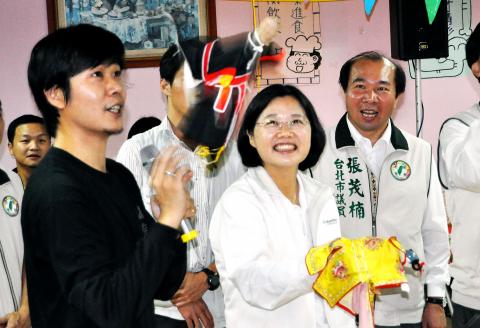President Ma Ying-jeou (馬英九) and Democratic Progressive Party (DPP) Chairperson Tsai Ing-wen (蔡英文) are locked in a tight presidential election race, with the latest media poll putting the lead Ma holds over Tsai within the poll’s margin of error.
A poll result released by the -Chinese language China Times yesterday showed that if only two pairs of presidential candidates were fielded, Ma and Premier Wu Den-yih (吳敦義) on the Chinese Nationalist Party (KMT) ticket against Tsai and DPP Secretary-General Su Jia-chyuan (蘇嘉全) on the DPP ticket, the support rate for the Ma-Wu ticket would be 44.3 percent, while it would be 41 percent for the Tsai-Su ticket.
Although the poll gave Ma a lead of 3.3 points over Tsai, it was the closest gap between the two candidates in the presidential surveys that the China Times has conducted in recent months.

Photo: Taipei Times
If People First Party (PFP) presidential hopeful James Soong (宋楚瑜) were to participate in the January presidential election along with his running mate, academic Lin Ruey-shiung (林瑞雄), the Ma-Wu ticket would garner 41.7 percent support, while the Tsai-Su ticket would gain 38.2 percent and the Soong-Lin ticket would receive 10.4 percent, the poll showed.
The poll questioned 1,074 people and had a margin of error of 3 percentage points.
On Monday, xfuture.org, a Web site with a platform similar to the stock market that allows users to predict the results of future events, said Tsai held a slight lead over Ma in terms of her percentage of votes and her possibility of getting elected.
As of Saturday, the exchange predicted that Tsai would receive 49.5 percent of votes, Ma would get 48.3 percent and Soong would take 7.5 percent. Tsai has held the lead in the past nine days, and in the past three days her margin has exceeded 1 percentage point.
On the possibility of being elected, on Saturday the exchange gave Tsai 44.8 percent, Ma 41.5 percent and Soong 13.5 percent.
It said Ma’s chances of winning the election rose steadily from early September, peaking on Oct. 16 when he was 18.7 percentage points ahead of Tsai. However, that lead narrowed after Ma floated the possibility of signing a peace pact with China within the next 10 years.
According to National Chengchi University’s Prediction Markets Center, prediction markets efficiently collect effective information through a futures or stock-trading mechanism that relies on the wisdom of the public, who buy and sell contracts of future events on the market.

SECURITY: As China is ‘reshaping’ Hong Kong’s population, Taiwan must raise the eligibility threshold for applications from Hong Kongers, Chiu Chui-cheng said When Hong Kong and Macau citizens apply for residency in Taiwan, it would be under a new category that includes a “national security observation period,” Mainland Affairs Council (MAC) Minister Chiu Chui-cheng (邱垂正) said yesterday. President William Lai (賴清德) on March 13 announced 17 strategies to counter China’s aggression toward Taiwan, including incorporating national security considerations into the review process for residency applications from Hong Kong and Macau citizens. The situation in Hong Kong is constantly changing, Chiu said to media yesterday on the sidelines of the Taipei Technology Run hosted by the Taipei Neihu Technology Park Development Association. With

CARROT AND STICK: While unrelenting in its military threats, China attracted nearly 40,000 Taiwanese to over 400 business events last year Nearly 40,000 Taiwanese last year joined industry events in China, such as conferences and trade fairs, supported by the Chinese government, a study showed yesterday, as Beijing ramps up a charm offensive toward Taipei alongside military pressure. China has long taken a carrot-and-stick approach to Taiwan, threatening it with the prospect of military action while reaching out to those it believes are amenable to Beijing’s point of view. Taiwanese security officials are wary of what they see as Beijing’s influence campaigns to sway public opinion after Taipei and Beijing gradually resumed travel links halted by the COVID-19 pandemic, but the scale of

A US Marine Corps regiment equipped with Naval Strike Missiles (NSM) is set to participate in the upcoming Balikatan 25 exercise in the Luzon Strait, marking the system’s first-ever deployment in the Philippines. US and Philippine officials have separately confirmed that the Navy Marine Expeditionary Ship Interdiction System (NMESIS) — the mobile launch platform for the Naval Strike Missile — would take part in the joint exercise. The missiles are being deployed to “a strategic first island chain chokepoint” in the waters between Taiwan proper and the Philippines, US-based Naval News reported. “The Luzon Strait and Bashi Channel represent a critical access

Pope Francis is be laid to rest on Saturday after lying in state for three days in St Peter’s Basilica, where the faithful are expected to flock to pay their respects to history’s first Latin American pontiff. The cardinals met yesterday in the Vatican’s synod hall to chart the next steps before a conclave begins to choose Francis’ successor, as condolences poured in from around the world. According to current norms, the conclave must begin between May 5 and 10. The cardinals set the funeral for Saturday at 10am in St Peter’s Square, to be celebrated by the dean of the College